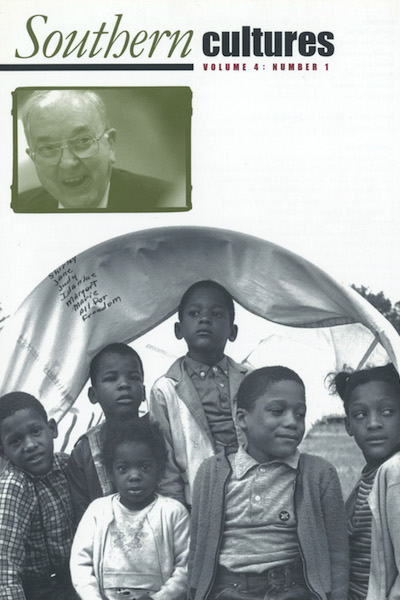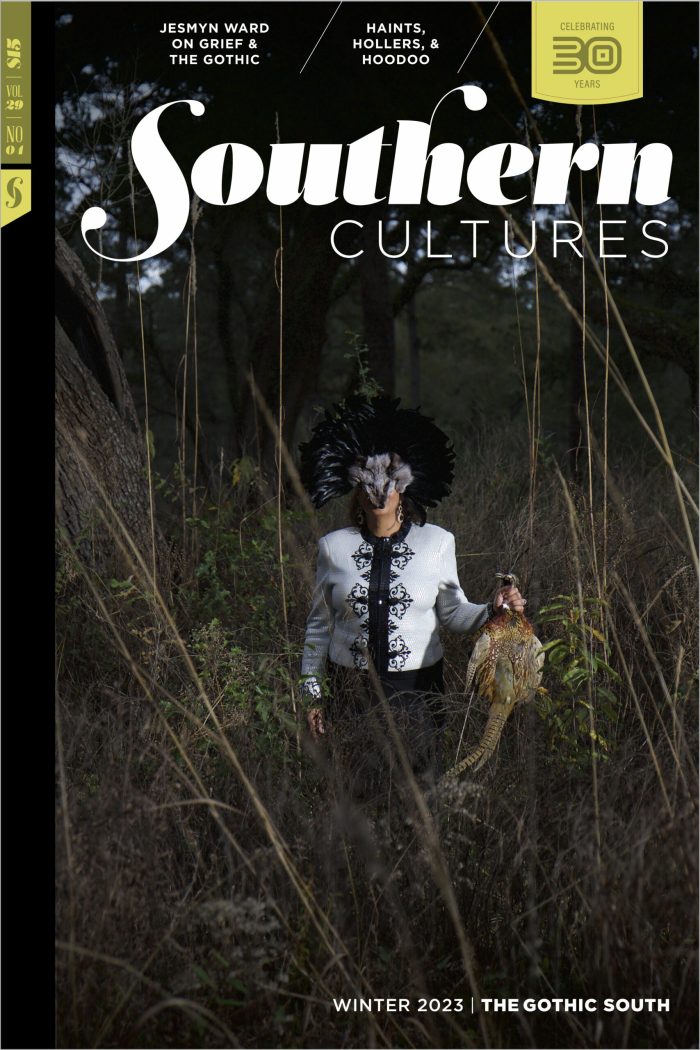by Harry L. Watson
For many of us, the process of self-government has become so dispiriting that politics itself has become a term of reproach, and aspirants to public office outdo one another in denunciations of the government they wish to join. William Faulkner prefaced Requiem for a Nun with an evocative story about the origins of civic justice »
by Tony Horwitz
Southern Cultures: So, how did you get interested in this business of Black Confederates? Tony Horwitz: I kept hearing about them wherever I went while researching my book. “Black Confederates” has become something of a mantra in certain southern circles. At Sons of Confederate Veterans meetings, there would be talk of erecting a monument to »
by Ferrel Guillory
“But, whoever suggests that the political southernization of America has come to pass must also reckon with what has come to pass in southern politics.” The elections of 1992, 1994, and 1996 have given commentators plenty of evidence to assert that American politics has been thoroughly “southernized.” President Clinton is from Arkansas, Vice President Gore »
by Whit Ayres,
Jon McHenry
If the truth be known, many southern Republicans are pinching themselves as the 1998 election approaches, amazed at and wondering about the extent of their success. Consider recent Republican accomplishments in the formerly Democratic “Solid South.” Republicans hold eighty-two of the U.S. House seats in the thirteen-state South, up from forty-four in 1990. The Democrats »
by Mac McCorkle
“Caution in predicting the southern political weather might seem to be in order.” The young W. J. Cash penned these words after Herbert Hoover’s conquest of North Carolina, as well as three other southern states, in his 1928 presidential victory over New York’s Democratic Governor Al Smith. Cash was not the only observer foreseeing a »
by Cole Blease Graham Jr.
“They were Republicans under the skin, but they could not join a party indentified with the destruction of the South.” The “rock” in this case is the Granite State of New Hampshire; the “hard place” is the South, where Republican candidates for any office have had a hard row to hoe over the last century. »
by Ferrel Guillory
“How is it that a state with a reputation for moderation, even progressivism, elects Jesse Helms?” January 11, 1997, was a frigid Saturday with the sort of clinging cold that stings the ears and numbs the toes. Still, about five thousand citizens of North Carolina gathered outdoors on the wide lawn in front of Broughton »
by Natalie Davis
“Alabama politics is not about Democrats and Republicans; it’s about plaintiff lawyers and big business.” The image of Alabama and its politics—from dogs and hoses in Birmingham, to George Wallace standing in the doorway of the university in Tuscaloosa, to a Gadsden judge who insists on hanging the Ten Commandments in his courtroom—is negative, primitive, and redneck. But »
by Thad Beyle
The shift from party-centered campaigns to candidate-centered campaigns has contributed to the escalation of the costs of running for elective office in the United States. In the modern era, heavy use of television, radio, and direct mail has emerged as the primary means with which to communicate with voters. As political scientist Frank Sorauf observed, »
by Sue Tolleson-Rinehart
“Southern women still achieve firsts that have long been secured by women in other regions.” Ah, the flower of southern womanhood: gracious, lovely, and charming. Many features of southern culture have changed greatly over time. In one way, though, the South retains its distinctiveness: it remains the region of the country least hospitable to the »
by Dan Blue
“The first thing we’ve got to do is use political campaigns again as the way to establish dialogue and a way to paint a view or a vision of where we ought to be.” Political campaigns happen to be the ideal place to talk about what your vision for a place ought to be. If, »
by Roland L. Freeman
“Reminiscences and a gallery of photos documenting an unfinished journey that began thirty years ago.” On 16 September 1997, civil rights activist Bertha Luster called me from Marks, Mississippi. I had first met Ms. Luster and her six children in 1968 on the Mule Train, part of the Southern Christian Leadership Conference’s (SCLC) Poor People’s »
by Robert A. Pratt
University of North Carolina Press, 1995 Over the past twenty years, numerous scholars have examined in considerable detail the desegregation experiences of urban school systems throughout the United States. Understandably, the Supreme Court’s 1971 decision to allow busing as a desegregation tool has been the focal point of many of these studies. When the success »
by William L. Barney
University of North Carolina Press, 1997 No issue played a more direct role in the coming of the Civil War than the status of slavery in the federal territories. Territorial acquisitions more that tripled the size of the United States in the first half of the nineteenth century, and each addition of territory reopened debates »
by Elizabeth D. Leonard
University of North Carolina Press, 1996 Some years back I heard a conference talk in which Darlene Clark Hine pondered the focus of recent scholarship on the experience of non-whites and non-elites in American history. Although she heartily commended all efforts to bring the stories of traditionally subordinate groups to light, Hine caught many of »
by Johanna Nicol Shields
University of South Carolina Press, 1996 This new collection of a dozen tales by the Old South’s most famous writer, South Carolina’s William Gilmore Simms, seeks to broaden Simm’s modern audience by making available a selection of his short fiction in an attractive format. Editor Mary Ann Wimsatt has provided a useful chronology of Simms’s »
by William Harmon
University Press of Mississippi, 1997 Twenty years ago, Craig Raine started a fad for poems about ordinary things as if seen by an extraterrestrial, as in: “A Martian Sends a Postcard Home”: Model T is a room with the lock inside- key is turned to free the world for movement, so quick there is a »
by Alex Albright
W.W. Norton & Co., 1997 This elegant and lavish anthology, published by Double Take magazine in cooperation with Norton, boasts eleven suburb photographic portfolios intermixed with fine stories by several of the South’s best writers. It also features Allan Gurganus’s deft afterword, “Toward a Creation Myth of Suburbia.” What it lacks, however, prevents it from being the »
by Dale Volberg Reed
Corcoran Gallery of Art, 1998 The cultural life of Harlem in the 1920s and 1930s was largely the creation of southern expatriates. Think only of the writers Langston Hughes, Zora Neale Hurston, and James Weldon Johnson; the musicians Bessie Smith, Louis Armstrong, and Eubie Blake; and the painters William H. Johnson, Marvin Gray Johnson, and »
by Gavin James Campbell
On 17 August 1844, a Tennessee schoolteacher named Jason Niles joined a large crowd of spectators to watch the raising of a “Clay pole” celebrating the Whig party’s presidential ticket of Henry Clay and Theodore Frelinghuysen. Local party organizers were undoubtedly embarrassed when the pole fractured and had to be sent to the local blacksmith’s »
by Jerry Leath Mills
Throughout the rural South, men with regular business in the country—hunters, fishermen, farmers, surveyors, and traveling agents of various trades—traditionally enjoy a repast known as the Store Lunch. I say “men” advisedly, for this tends to be a gender-specific ceremony seldom enjoyed by women. The beauty of this meal lies partly in its simplicity—everything needed »





